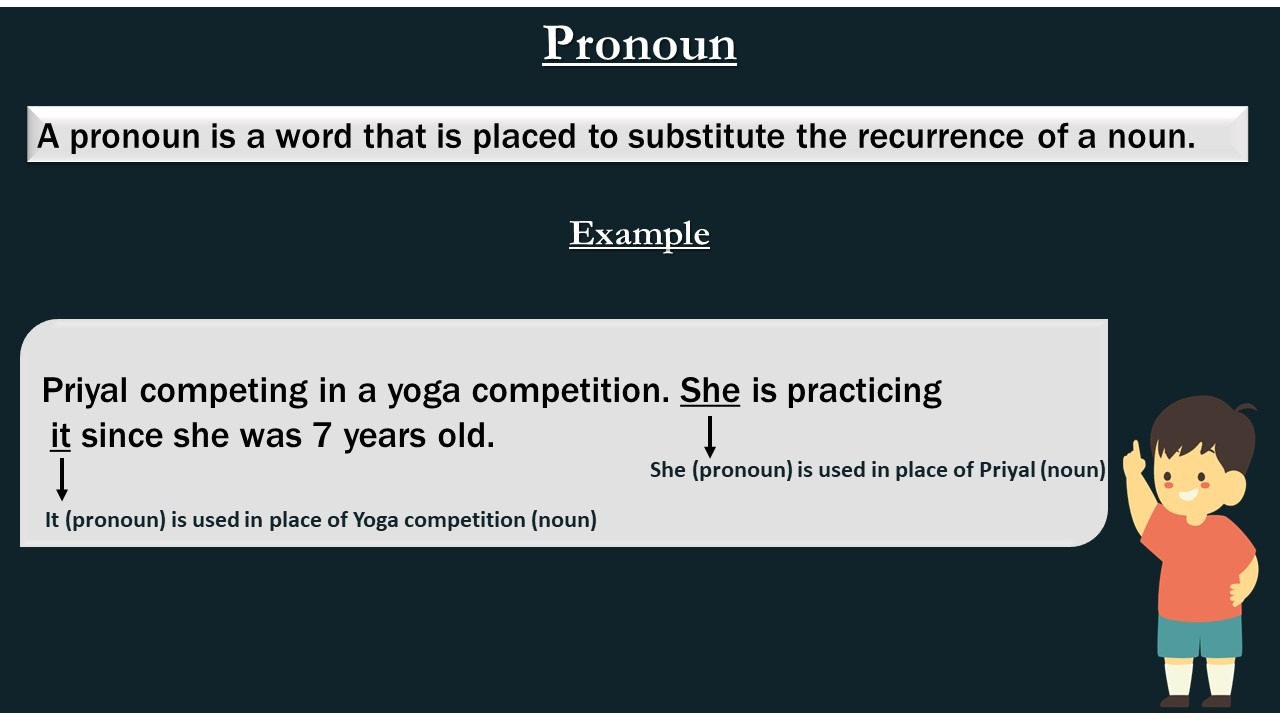Pronoun
In linguistics, a Pronoun is one of the types of speech. The usage of pronouns is to cease the repetition of nouns in a sentence or paragraph.
For instance: Suppose we have to find out the word that is recurring again and again in the below paragraph.
“Tanisha likes to sing. Tanisha’s voice is melodious like a nightingale, but Tanisha still needs proper training and a singing teacher who sharpens Tanisha.“
The repetition of the word “Tanisha” is so many times. So, we can write this paragraph like this also:
“Tanisha likes to sing. Her voice is melodious like a nightingale, but she still needs proper training and a singing teacher who sharpens her.“
Do you know the words (such as she and her) that we replace from the noun (Tanisha), what do we call these words?
These words are termed as PRONOUNS. In this article, we will learn about “Pronoun and their types with examples.”
Meaning of Pronoun
Pronouns are the combination of words used as a replacement for nouns (person, place, animal, thing).
For Example: I, We, Them, They, He, She, It, Their, There, etc.
Moreover, pronouns are used to eliminate duplication of nouns in the sentence. If we don’t have pronouns, we have to repeat the nouns in each and every paragraph.

10 Types of Pronoun
We categorize the pronouns into 10 different types:
Personal Pronoun
Personal pronouns are groups of words that are used specifically to replace the reoccurrence of a person’s or animal’s name.
For Example: I, We, Me, Us, He, She, It, Me, You, We, They, Them, Their, Him, Her.
For Instance:
- Riya wants to buy a dollhouse, but she can’t convince her mother to purchase it.
(In this example, she represents Riya, and it is used for the dollhouse.)
Demonstrative Pronoun
Demonstrative Pronouns are words that put the spotlight on an object, person, animal, or being.
For Example: This, That, These, Those.
For Instance:
- Our artisans’ paintings are better than those of competitors.
Possessive Pronoun
Possessive pronouns are the cluster of words that reveal the custodianship of an object.
For Example: mine, ours, yours, theirs, hers, his.
For Instance:
- That cat is hers, not his.
Distributive Pronoun
Distributive pronouns deliver information discretely to a person, a being, or an object.
For Example: each, everyone, either, neither, any, anyone, none.
For Instance:
- Each of the apples was rotten.
Indefinite Pronoun
Indefinite pronouns are used for unidentified persons or objects.
For Example: anybody, anyone, anything, everybody, everyone, everything, somebody, someone, something, nobody…….
For Instance:
- Everyone has his way to learn.
Reflexive Pronoun
Reflexive pronouns are used in those sentences where the subject and object are the same.
For Example: himself, herself, myself, itself, ourselves, themselves, yourself, yourselves.
For Instance:
- I trust myself.
Relative Pronoun
Relative pronouns are used to merge the independent clause with the subordinate clause.
For Example: as, but, that, what, who, whom, which.
For Instance:
- Riya bought a book, which she purchased after breaking her piggy bank.
Emphatic Pronoun
Emphatic pronouns are those pronouns that are used to put stress on nouns or pronouns.
For Example: myself, himself, herself, itself, yourself, yourselves, ourselves, itself.
For Instance:
- I myself paint this wall.
Interrogative Pronoun
Interrogative pronouns are used to ask questions when we want to know about something or someone.
For Example: what, which, who, whom, whose.
For Instance:
- By whom was the Mahabharata written?
Reciprocal Pronoun
Reciprocal pronouns manifest the relationship between two or more persons or objects equally.
For Example: each other, one another.
For Instance:
- We decided to agree with one another.
Pronoun Practice Exercise
| 1. Which kind of pronoun is used to ask a query? a) Demonstrative Pronoun b) Interrogative Pronoun |
| 2. Myself is an example of __________ pronoun. a) Possessive b) Distributive |
| 3. Indefinite pronouns are used only in those sentences where the subject and object both are identical. a) True b) False |
| 4. Pronouns specifically substitute the ____________. a) adjectives b) nouns |
ENGLISH-RELATED CONCEPTS:






